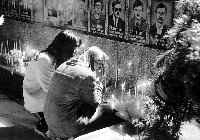Memorial Candles of Chornobyl

Ukraine will have to remember the Chornobyl Nuclear Power Plant disaster for many decades to come. Official data alone indicate as many as 3,235,984 casualties. Over a thousand people suffer from the thyroid cancer, and morbidity rate increases with each passing year. The widespread radiation has an unpredictable effect on human genes, and we are still unable to fully assess the consequences of the disaster.
But it is in our power to give a new, if short, lease of life to those who were inside the accursed station on the night of April 27 and lost their health forever trying to save us all.
Despite current legislation, which allows Chornobyl victims to receive free medical care and medicines, they are in fact being denied this in most clinics and pharmacies. The disabled have not received for over five months their so-called "bread money" to buy the necessary counter-radiation foodstuffs. Transport allowances have not been paid for almost eighteen months, while most disabled cannot move without assistance.
"When the disaster occurred, I worked in the Chornobyl Plant construction department," says first-grade disabled Serhiy Krasylnykov, Chairman of Union Chornobyl Invalids, "Late at night, we were woken up and taken to the station. As a result of the radiation dose I got, I became a first-grade disabled and lost my legs. In spite of illness, I have to raise and put on their own two feet two eight and nine-year-old children. The Hr 140 pension I get is not enough for this. Most of my colleagues are in a similar situation. For example, the 16-year-old daughter of one of our organization's members who was on duty at the station on the night of the disaster is suspected of having thyroid cancer. So far, the diagnosis has not been confirmed, but if it is, Volodymyr will need money for treating his child. Where will he be able to get it?
"Being well aware that the state is unable to pay all the Chornobyl victims' costs, our organization has been trying for several years running to implement a project of providing the disabled with work they can do. If at least one enterprise were set up where they could work according to their physical abilities, the disabled would not only be earning a living but also assisting the state. But to do so, we need support from the executive power, which we, unfortunately, still do not have."
This is why the Chornobyl disabled met chairman of the Verkhovna Rada
Committee for Social Policies and Labor Yevhen Marchuk last Thursday at
the Kyiv aircraft factory club. "The Chornobyl disabled have to face insoluble
problems every day," Mr. Krasylnykov told The Day, "We asked People's
Deputy Marchuk to meet us, for it is only the legislative committee he
heads that can really help us."
Выпуск газеты №:
№16, (1999)Section
Day After Day





